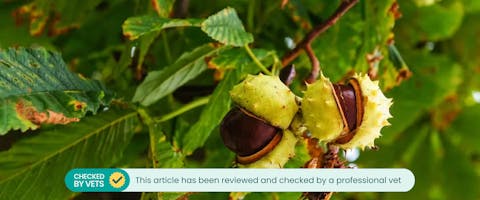Updated 13/07/2023
Growing in temperate areas, horse chestnut trees (i.e. the trees that grow conkers) are fairly common in woodland areas popular for walkies! But are horse chestnuts poisonous to dogs or can dogs eat horse chestnuts? Get in the know below…
Trending posts
Purr-use some of the top blogs our members have been loving this month- Top male dog names for your new furry friendGot a new furry family member in your pack? Check…

- Top female dog names for your new fluffy palWelcoming a new pooch into your family? Explore…

- 250+ gray cat names your silver feline will loveRecently welcomed a fluffy gray bundle of joy into…

- What are normal pet sitting rates?Discover the average pet sitting rates for animals…

- Unique dog names to stand out from the packDare to be different with our list of the best…

Are horse chestnuts poisonous to dogs?
So, are horse chestnuts toxic to dogs or are horse chestnuts good for dogs? It’s safe to say that horse chestnuts (and all parts of the horse chestnut tree) are toxic to dogs, and some dogs can become very unwell if enough conkers are eaten. Containing a neurotoxic glycoside called aesculin, ingestion of the plant can cause signs of toxicity in your pooch. Fortunately, horse chestnuts are bitter tasting which can put off some dogs from trying to eat them, but some dogs will eat them even with the bitter taste, and this can make them unwell.
Horse chestnut poisoning in dogs
Poisoning from horse chestnut tree is dependent on how much of the plant or conkers they eat, and some dogs will develop severe signs if they eat a lot of the plant or horse chestnuts. So, while avoiding the trees is always a good idea if you’ve got a particularly curious canine on your hands, it’s worth having an idea of the symptoms of horse chestnut poisoning in dogs before fall rolls around!
Symptoms
The symptoms below can arise anywhere from an hour after your pooch ingested the plant and can continue for up to two days afterwards. If you think your pup has nibbled on part of the horse chestnut tree, you should contact your vet as a matter of urgency, even before symptoms start to show. Signs to be on the look out for are:
- Vomiting with blood
- Diarrhea
- Abdominal (belly pain)
- Lethargy
- Increased thirst
- Drooling
- Reduced appetite
- Diated pupils
- Muscle twitching
- Tremors
- Inccordination or loss of balance
Along with these nasty symptoms, it’s also worth noting that conkers (the fruits of the horse chestnut tree) are not only poisonous to dogs, but they also pose a serious choking hazard and can cause a blockage in the stomach or intestines, sometimes needing surgery to remove the horse chestnuts.
Diagnosis
If you think your pup’s curiosity has gotten the better of them and they’ve eaten part of the horse chestnut tree, it’s vital you phone your veterinarian immediately to start treatment as soon as possible.
If possible, take some of the leaves or material your dog has eaten for your vet to confirm that it is the horse chestnut plant or conkers that have been eaten.
After arriving at the vet clinic, your vet will give your dog a health check, and may take blood and urine samples to see how unwell they are before giving treatment for the signs of toxicity.
Treatments
The treatment that’s recommended will depend on the severity of your pup’s symptoms and how long ago the horse chestnut was ingested. Vomiting may be induced to remove any horse chestnut still in the stomach. Intravenous fluids may be given to avoid your pup dehydrating along with gastro-protective drugs.
Recovery
Most dogs have mild signs after eating horse chestnut and recover well with treatment. There are some dogs - especially those who have eaten a large amount of horse chestnut - who can become very unwell and they usually take a few days to recover. Very rarely horse chestnut toxicity can be fatal, so always visit a veterinarian if you think your dog has eaten horse chestnut.
Meet our veterinary expert, Corinne
This article has been checked by veterinarian Corinne Wigfall BVMBVS(Hons) BVMedSci(Hons). Corinne is originally from Wales and moved to New Zealand after graduating university. She started her career with a university based equine internship and moved onto mixed and small animal practice. Currently she splits her time between online tele triage and working in an after hours vet clinic.
Other plants that are poisonous to dogs
It turns out that many of the plants around us are poisonous to dogs, and should be avoided at all costs. To make your walkies trips, home and garden as safe as possible for your pup, get in the know about plants poisonous to dogs, starting with those below.

